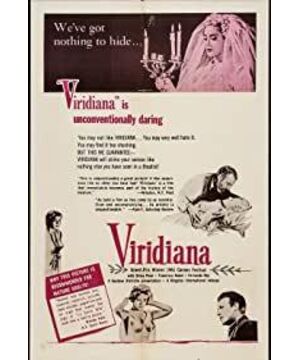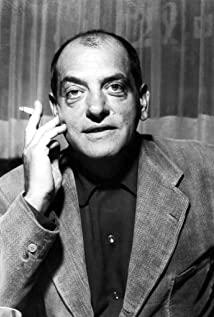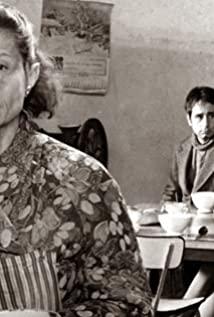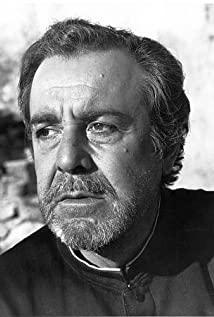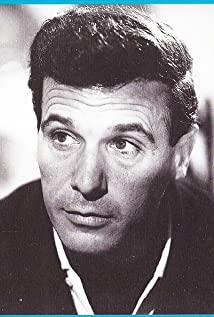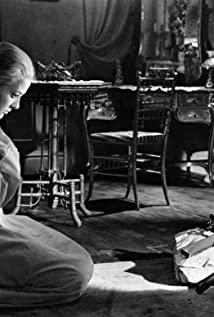While reading a related review, a friend described Buñuel as a "screaming madman," and I took that to heart in the first month of watching his films. But when I saw the second month, I found that the description was not accurate. Buñuel, dubbed the "father of surrealist cinema", who is absurd and always confused the audience, actually has a very rational and implicit side.
In his book, he wrote about aging, deafness and blindness that kept him from watching movies for four years, and also made him shy in communication. Speaking of amnesia, he said that the absence of memory is death. The amnesia that his mother had had a shock to him, and he finally reached the same age as his mother at that time, "waiting for the last amnesia to come, which will erase a person's life"... When I read these words, it is hard for me to imagine that this is a director who shoots the scene where the knife cuts the eyeball and the person drags the donkey to death. But after seeing that he chopped down other people's Christmas trees at Chaplin's Christmas party, and joked to reporters that he gave Oscar a bribe of $25,000 and other magical acts, he was sure that Buñuel's body had been flowing all the time. Passionate surreal blood.
Yes, this is an uncle full of contradictions. From character to three views to works, they are full of strange contradictions.
In Buñuel's work I've seen, the themes are mostly three things: desire, religion, and the bourgeoisie. While dealing with these three important spiritual motifs in his life, Buñuel's attitude is full of ambiguous and swaying.
"Unexplainable, the failure of a simple desire. There are often similar failures in my films." A group of "high-class people" who want to get out of the house but can't get out for no reason want to have a meal together forever The interrupted bourgeoisie, the rich old man who wanted to sleep with a beautiful little girlfriend but was always rejected... I don't know why Buñuel always likes to express this kind of unfulfilled desire. At first, I watched "The Golden Age" ", I thought it was a satire on the corruption of the middle and upper classes, and government officials were not doing their jobs and thinking about sleeping women all day long. But after reading Lao Bu's own autobiography, he seemed to think that he was praising the crazy behavior of the male lead. "This story is also a series of spiritual and surreal aesthetics... It's a romantic film dominated by surreal fanaticism." Watching "Destroy Angels", I thought it was saying that the bourgeoisie will become With the straw bag, the outside world is stubborn and the inside is against the inside. But watching Buñuel himself said that there is no irony in this film, it is just to express the many difficulties in life, getting out of one and falling into another... In short, I have never been able to fully watch his film once. I understand what he is talking about, and every time I summarize the theme of the film smartly, I will be embarrassed when I read the old man's own explanation.
Speaking of desire, the most "relish" in desire is desire. Catherine Deneuve impressed me in "Beauty in the Day", probably because there are many men who can admit to enjoying sex, but relatively few women. According to the crazy temperament of surrealism, pornography seems to be more exposed and open. But Buñuel's pictures are very restrained, there are not even any nudity scenes, and the tough sex scenes are only completed off-screen. In his autobiography, Buñuel wrote that his sexual desire was not too strong, and he also wrote about sexual fantasies, but it is surprising that he has only married one wife in his life. So on the whole, Buñuel is actually a shy old man??
The second key word in Lao Bo's films is religion, and he still seems to be full of contradictions on this point. Spiritually atheist, culturally Catholic. The creed that sounded very incredible was actually implemented by him throughout his life. There are more or less mockery of Catholicism in the religious trilogy. The creepy laughing Christ, the "Last Supper" posed by the beggars, the ascetic who came to the modern bar with Satan..."Simon in the Desert" and "Vellitiana" seem to express God The collapse of the believer's faith, followed by the end of the world and desire. "Nazarin," the earliest film in a religious trilogy, seems to reveal more clearly Buñuel's swing of faith.
Nasalin's kindness from beginning to end in the movie moved me very much. He is a faithful believer of Catholicism and can give up all external things to help all beings. But after being abandoned, framed, and smeared, even though he was as firm as him, he could not help but shake his faith in his Lord. Why didn't my good deeds lead to a good ending? How much can I change the world by myself? At the end, Nazalin walked silently on the way to be escorted, and an old woman gave him a pineapple to quench his thirst. For the first time, facing Shan, he silently walked away. But in the end, he turned around, took the pineapple, and whispered "thank you". Seeing this, I was moved by this sad movie with blurry picture and sound quality. Nazarin is probably the most positive cleric in Buñuel's story. Others are more or less incoherent with the secular society. Like Velitiana, at the beginning, "Dedication to the Lord" was the rule of life, but after she was almost raped by the poor she helped, she became confused.
I was also puzzled. In the past, I have always been very sure of the instructive power of religion. But "Velitiana" leaves me in a similar confusion as Buñuel: Is there a class in the audience of religion? A man is born with poverty and chaos. When he grows up, you tell him that what you have experienced is your destiny, you have to do a lot of good deeds, and you will be happy in your next life! I believe the answer to such a preaching will be an old punch. The beggars in the movie don't know how to repay their kindness and revenge, but Verityna's kind deeds did not influence them, but intensified more sinful desires. From this point of view, is the educational function of religion limited, and the more miserable people are and the less material conditions they have, the less chance they have of being saved... On this point, Lao Bu's point of view is more radical. It is even hypocritical to think that religion is in the service of the bourgeoisie. But growing up in a Catholic family, he was so immersed in his eyes and ears that he couldn't let go of the influence of religion on him from his emotions. So he said that at his future funerals, he would invite both his surreal friends and the pastor to pray for him. What an amazing scene! Only Buñuel can do this.
It seems to be a lot of useless. The battle line of this article is very long, and I feel like I have to forget what I said before... Okay, continue to the third point. Regarding class, Buñuel was born in a middle-class family, and his childhood was carefree. When he grew up, he "didn't learn well" and joined a small group of surrealists, getting acquainted with Breton, George Sadur, Dali and others. Most of these surrealists seem to come from middle-class, bourgeois families, although they are doing things that defy tradition and look down on the bourgeoisie. Is it because Lao Tzu is powerful enough that his son can go against Lao Tzu when he has money and spare time? Many of the protagonists of Buñuel’s films are bourgeoisie. Even if his autobiography says that these films are not malicious to the bourgeoisie, I don’t see any good intentions in him: the officials discussing how to do the drug business, A beautiful wife who is indifferent to her husband but goes out for prostitution, and a lecherous old man who doesn't go out to work to earn a living... In my impression, his films do not have a very likable bourgeois character, and they are all a bit baffling. But while sparing no effort to blacken these bourgeoisie, Buñuel retains a lot of "bourgeois" habits all his life. He loves cigarettes and alcohol, and is especially obsessed with alcohol; he loves beautiful women, and he likes to go to brothels when he is young; he doesn't like to go to work, and thinks that working for money and not for pleasure is a hooligan, and so on. I sometimes even feel that the roles that Fernando (the one who always plays the lewd old man in his movies) are just pieces of Buñuel, doing things he wants to do but dare not do in reality, saying What he said in reality but no one listened.
Numerous contradictions have converged into the magical life of Buñuel. He said that although he hated newspapers, he still crawled out of his grave to buy a newspaper every fifty years after his death. Look at the world, the world is changing. More than 30 years have passed, and now it is a vicissitudes of life, and the time when surrealism prevailed has long been a thing of the past. I don't know what kind of emotion he will express when facing this world that has undergone great changes when he climbs out of the grave. At that time, even buying a newspaper seems to be a problem.
View more about Viridiana reviews


